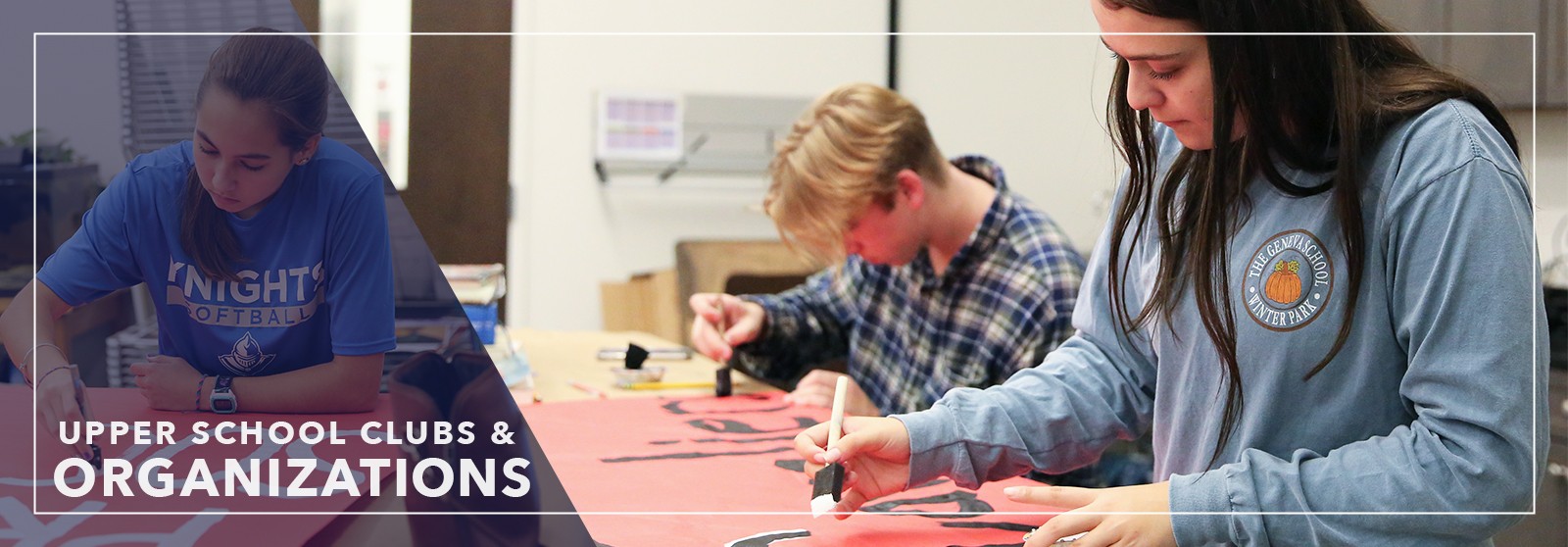Upper School Clubs and Organizations
The Geneva School’s community of faith and learning transcends the curriculum in numerous ways. One important way is found in the variety of cocurricular clubs and organizations. These venues offer a deepening opportunity for growth in academics, the arts, and so much more. Relationships with peers and mentors in these groups enrich the daily disciplines of classes and school life. Students are encouraged to develop gifts and interests in a whole new way through these various opportunities.
Strategy and Board Games Club (7th–12th Grade)
All work and no play, they say, makes Jack a dull boy. To defend Jack (and his fellow students) against such dullness, the Strategy and Board Games Club introduces students to cooperative and competitive games that challenge the mind, engage the imagination … and are just plain fun! The club meets weekly after school to enjoy fellowship and gameplay.
Pep Club (5th–12th Grade)
Pep Club is a student-led organization that supports athletic, arts, drama, and other school events to encourage fellow Geneva students.
Merely Players Drama Troupe (7th–12th Grade)
Merely Players is Geneva’s theatre troupe and is open to students in 7th–12th grade. The group performs one show each semester and rehearsals are typically scheduled from 3:00 to 5:00 pm, four to five days a week. Because theatre is a communal art, students are expected to attend all rehearsals regardless of the size of the role. Students may also apply to be a part of the Unseen Forces, the stage crew for each of the shows. The crew works to help the actors create a show by doing everything but the acting and is a vital part of each performance.
Student Senate (9th–12th Grade)
Through the student senate, students take an active role alongside the house system in determining the culture of the rhetoric school by deciding upon, planning, and implementing traditions, events, and projects. Additionally, to some degree, the student senate may affect policy through representing concerns of the student body to the administration. Most importantly, however, the student senate has the responsibility of maintaining the “feel” and direction of the rhetoric school through servant leadership. Senators are chosen to represent both their grades and their houses (one representative from each grade per house).
Fellowship of Christian Athletes (9th–12th Grade)
Fellowship of Christian Athletes is touching millions of lives . . . one heart at a time. Since 1954, FCA has been challenging coaches and athletes on the professional, college, high school, junior high, and youth levels to use the powerful platform of sport to reach every coach and every athlete with the transforming power of Jesus Christ. FCA focuses on serving local communities around the globe by engaging, equipping, and empowering coaches and athletes to unite, inspire, and change the world through the gospel.
FCA meetings are aimed at helping to encourage and form a student’s faith in Christ. The meetings are called Huddles. Each Huddle consists of four parts: Welcome, Warm-up, Workout, and Wrap-up. Huddle meetings begin with welcoming students to the meeting and a few announcements about upcoming events. The Warm-up portion of the meeting includes a game or mixer to help students get to know one another better. The Workout is the part of the meeting that includes a Bible lesson or a speaker to emphasize an aspect of the Christian faith to focus on for that meeting. The Wrap-up includes a closing prayer and encouragement as we look forward to the next Huddle. Student-leaders guide and facilitate small groups in the meetings. The Huddles take place regularly during the lunch hour.
Student Astronaut Challenge (9th–12th Grade)
The Student Astronaut Challenge is an aero-space–based competition sponsored by Florida State University and presented with cooperation from NASA and the Kennedy Space Center. The focus of the competition is the mobile Space Flight Simulator, which was designed to replicate the retired NASA Space Shuttle. Students meet weekly to practice their teamwork skills, build their design challenge submissions, and practice for the simulator. The competition takes place over three days at Kennedy Space Center in early February. For more information about the competition, please visit studentastronautchallenge.com.
Biblical Justice Club (9th–12th Grade)
As Christians, we believe that scripture grounds the source of both human dignity and justice within the person and nature of God. People are made in the image of God (Genesis 1:27), and we hold this truth to be the source of human dignity. Humanity bears the imago Dei regardless of race, class, gender, ability, or nationality, and thus Christians should speak and act against anything that diminishes or devalues that image in any person. Additionally, we have been called to “do justice, love mercy, and walk humbly with our God” (Micah 6:8). The concept of justice in the Bible is closely linked to righteousness and to right and equitable treatment of people (Amos 5:24; Psalm 11:7, 33:5, 50:6, 72:2, 89:14, 103:6, 106:3; Matthew 23:23). This is especially true in regard to those who are vulnerable in society. Therefore, we take this call to mean that we should focus our concern on the vulnerable (Isaiah 1:17; Psalm 41:1, Jeremiah 22:3; Psalm 103:6) and should speak up for the needy (Proverbs 31:8-9), not because they are more valued by God, but because they lack the social, financial, and/or cultural capital to do so for themselves in an equitable manner.
As a club, we seek understanding, empathy, and action in joining other Christians around the world who seek to make a difference in areas where there is injustice in order to pursue Christ’s prayer that the kingdom of God may be “on earth as it is in heaven” (Matthew 6:10).
Writers Guild (9th–12th Grade)
This club meets to discuss literature and to read and critique each other’s written work. Students interested in writing poetry or prose are welcome to these occasional lunch meetings.
Imago Dei Club (9th–12th Grade)
Based upon the biblical truth that all people are created in “the image of God,” this club meets to discuss the challenges (and blessings) of those in our community who have special needs, and how to help meet those needs and minister in the name of Christ. Service projects are normally enacted outside of school hours.
Women of Faith (9th–12th Grade)
Rhetoric school girls are welcome to meet together during lunch for inspirational times of Bible study and prayer. Normally meets twice per month.
Spanish Club (9th–12th Grade)
Students of Spanish and other languages are invited to join the Spanish Club. The club seeks to increase understanding of cultures where Spanish is spoken. A goal of the club is to work toward taking a mission trip to a Spanish-speaking country.
National Honor Society (11th–12th Grade)
The National Honor Society (NHS) is a national organization established to recognize students for their scholarship, leadership, character, and service. In our Post Tenebras Lux chapter of NHS, service is emphasized most highly. As a student-run organization, our chapter provides members with opportunities for the kind of servant leadership modeled by Christ, both within and outside our school community. Inductions take place in the spring of each year. Students in tenth–twelfth grade who meet the GPA requirement are invited to apply for induction into NHS.


